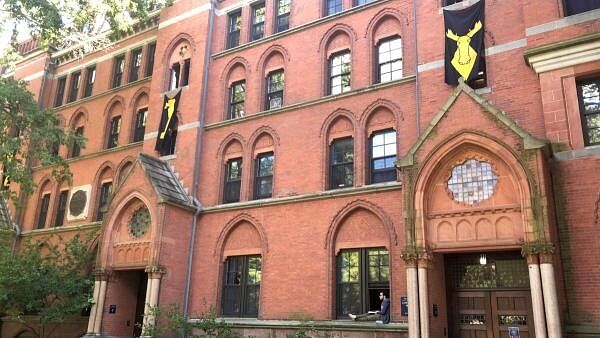
Lawrance Hall at Yale University in New Haven, Connecticut, US.
Credit: Reuters Photo
US-based international educational institution Yale University issued an apology recently for its connection to slavery— that surfaced in a book titled Yale and Slavery: A History which mentions the name of Elihu Yale (1649-1721) after whom the University is named.
The book authored by Yale history professor David W Blight — under the Yale and Slavery Research Project — stresses on many factors highlighting the fortune earned by Elihu Yale, who ascended to the position of governor-president of Madras from 1684-85, and again from 1687-92. Yale arrived in Madras in 1672.
Varsity's apology over Yale's involvement in 'slave trade'
Born to a rich merchant family in 1649, in Boston, Yale became a clerk for the East India Company in 1670 when he was 21-year-old. After a few years of service, he was later stationed in India as a writer— a term used by the Company for its junior-most employees.
"Today, on behalf of Yale University, we recognize our university's historical role in and associations with slavery, as well as the labor, the experiences, and the contributions of enslaved people to our university's history, and we apologize for the ways that Yale's leaders, over the course of our early history, participated in slavery," the US educational institution said in a statement recently.
The core fact on which Yale University came out with an apology is Elihu's involvement with the East India Company in the sale and purchase of human beings. During his tenure as the governor president of Madras, many people in this South Indian state were enslaved to carry out the routine operations of the company.
“A devastating famine led to an uptick in the local slave trade … Yale and other company officials took advantage of the labour surplus, buying hundreds of slaves and shipping them to the English colony on Saint Helena,” the Indian Express quotes Historian Joseph Yannielli as saying who said this was the time when Elihu served on the governing council at Fort St George, which was the British fortress in Madras.
Referring to the trade affairs of the Company, the author of the book, Blight said, “this commerce was inseparable from the slave trade.”
Excerpts from the book shared by Reuters read: “There can be no question that some portion of Yale’s considerable fortune, amassed while British governor-president in Madras, derived from his myriad entanglements with the purchase and sale of human beings.”
"The records further demonstrate that in this busy and valuable port of the British Empire, varying practices of slavery were ubiquitous," the parts in the book read.
How the varsity was named after Elihu Yale?
Elihu was removed from the position of the governor in 1692, and is said to have returned back to England in 1699 after amassing wealth from India, being involved in myriad corrupt practices. He left India with a “record of arrogance, cruelty, sensuality, and greed”. Blight also records certain events in his book where in one instance Elihu "ordered the hanging of an Indian stable boy who had absconded with a Company horse".
Being one of the richest men in England, Elihu had long been "a collector of art, jewels, Chinese porcelain, textiles, fine furniture, and books"— as Blight writes in the book. This is the point when Yale University stands with the name.
Elihu became one of the biggest benefactors of the Collegiate School in New Haven, Connecticut. Elihu sent a major part of his fortune that he had to this school which was constructed in 1701, but was struggling for funds. The Collegiate School sold Elihu's offerings after which the proceeds were used to build the Yale College in 1718— which today stands to be one of the top 10 oldest institutions worldwide, for higher education.